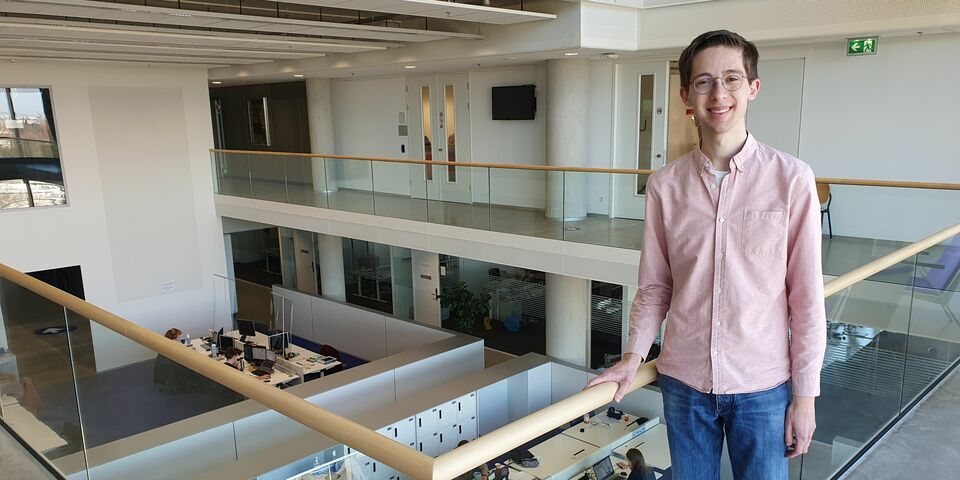As yet no run on NXP scholarships for Electrical Engineering students
The scholarship program that NXP launched last year in cooperation with the Department of Electrical Engineering still has room for participants this coming academic year. The NXP Scholarship in the field of Millimeter Wave Wireless Technology offers students an interesting real-world assignment, coaching by NXP Fellows and 5,000 euros. Thomas Booij is one of the current participants and he tells what this year has brought him.
Seven students were found suitable by the EE department to take part in the scholarship program. The selection is rigorous; up to ten could have been accepted. With a letter and a video pitch, EE students starting their master's had to convey their motivation.
This opportunity was, in the words of student Thomas Booij, “not tremendously well advertised”. It was brought to his attention by Graduate Program Director Marion Matters during a chat about a potential holiday job in the summer vacation. She asked me whether it was something I'd be interested in.” The vice dean had read him well.
Booij was extremely keen to work with NXP. “I am crazy about chips, and NXP is a global player in that field. A thesis might also have brought me into contact with them, but this is an entirely different arrangement. Not a final project but a simulation of working practice involving an RFI, a request for information. It's a particular type of assignment. A customer gets in touch with a manufacturer, who responds by putting engineers to work on their 'request' with a view to producing a proposal for the customer. In this case, we are the engineers.”
Radar
“This approach takes us a step further than would otherwise be customary,” says Booij. “We have been asked to design a radar operating at 140 Gigahertz. This is the kind of radar that can be used in a car to detect very quickly, for example, whether a child is about to run out into the road. There are six students remaining in our group after one student stopped due to personal circumstances. Among them they cover various specialist tracks in Electrical Engineering. Three students, including myself, are working on integrated circuits. We are the chip designers. Two students are specializing in electromagnetism, we call them the antenna people, and one student is focusing mainly on signal processing.”
As part of their remit, the master's students must consider the optimum number of antennas or chips in the radar system to be designed. They work as a group. “Because everything is interdependent and we have to be realistic. We are also learning what is not possible within the framework we're given, and where the gaps are. That is very instructive. In theoretical assignments, the possibilities are endless, but it's not like that in the real world.”
Whatever is achieved within the six months can provide the groundwork for further research, but NXP does not insist on this; the scholarship is entirely without future commitment. Every student does it separately from his or her degree work and it earns no ECTS, but it does lead to a certificate. And, let's not forget, there is the scholarship of 5,000 euros, which is paid in monthly installments. For Booij, still living in Helmond with his parents, this is his chance to avoid accumulating debt when he moves into student accommodation. “For me, the difference is tangible, and I feel good about it.”
Room for improvement
The program is still in its infancy, as is borne out by Booij's own experience. He would have appreciated a more defined pathway. “Including, say, a tour of NXP. Or a deadline to work towards. We'd be keen to give a presentation to a group of NXP employees, as a lunchtime lecture of sorts.”
It's not escaped his notice that every aspect of the program is new, including the role of the two NXP Fellows. These are Domine Leenaerts and Kostas Doris, part-time professors at TU/e. “It took a while before we received the assignment. We started off doing the introductory track of the Honors program, in which this scholarship is available. The introduction is about personal development. From there you progress to working with a group of honor's students to define a program, but for us that simply became the NXP project.”
The newness is also evident in the network that Booij hoped to build: it still quite small. He has got to know the other five scholarship students well, but hardly any NXP employees. “That is understandable given the restrictions corona has imposed, and the busy diaries of our coaches.”
Whatever the teething problems, this is an experience Booij would not have wanted to miss. “It is exceptional to get the chance during your master's to design a system from scratch, you'd usually be building on an existing technology.” And for him personally there is another plus: “I tend to move mostly in the academic world, and will happily continue to do so. After my graduation, which I am working towards alongside this NXP program, I plan to take my doctorate here at Electrical Engineering. So despite being cloaked in academia, I've had a chance to dip my toes in industry.”
Few applicants
For this coming year, some NXP scholarships are available, and students of Delft and Twente are also welcome to apply. The low number of applicants is something the department attributes to the corona situation and the fact that the right channel for advertising the program had not yet been found. “It was on a web page but it didn't jump out at you,” says Booij. The reference can now be found not only on the department's Education page but also on the central page about TU/e scholarships.



Discussion